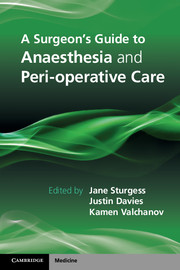Book contents
- Frontmatter
- Contents
- List of contributors
- Foreword
- Section I Basic sciences
- Section II Anaesthesia and peri-operative care for surgical specialties
- Section III At a glance
- Chapter 22 Scoring systems
- Chapter 23 Modes of mechanical ventilation
- Chapter 24 Fluids
- Chapter 25 Coagulation
- Chapter 26 Pre-operative echocardiography
- Chapter 27 Common drugs and doses
- Chapter 28 Physiology and risk in special circumstances
- Chapter 29 Medicolegal aspects of consent
- Chapter 30 Nerve injury
- Chapter 31 Pre-operative investigations
- Chapter 32 Enhanced recovery
- Chapter 33 Post-operative cognitive dysfunction
- List of abbreviations
- Index
- References
Chapter 32 - Enhanced recovery
Published online by Cambridge University Press: 05 July 2014
- Frontmatter
- Contents
- List of contributors
- Foreword
- Section I Basic sciences
- Section II Anaesthesia and peri-operative care for surgical specialties
- Section III At a glance
- Chapter 22 Scoring systems
- Chapter 23 Modes of mechanical ventilation
- Chapter 24 Fluids
- Chapter 25 Coagulation
- Chapter 26 Pre-operative echocardiography
- Chapter 27 Common drugs and doses
- Chapter 28 Physiology and risk in special circumstances
- Chapter 29 Medicolegal aspects of consent
- Chapter 30 Nerve injury
- Chapter 31 Pre-operative investigations
- Chapter 32 Enhanced recovery
- Chapter 33 Post-operative cognitive dysfunction
- List of abbreviations
- Index
- References
Summary
The enhanced recovery project has been embraced by almost all surgical specialties. The programme purports to offer benefits to all end users. What is apparent is that it involves, and requires engagement of every person involved in the patient pathway. The success of the programme does not exclude the patient nor their care-givers.
Proposed benefits of employing an enhanced recovery programme
General practice
Closer working relationships between the acute and primary care sectors – with recognition of good care from local commissioning groups
Family physician able to start the process of preparation for surgery, and get ready to receive the patient back with good information post-operatively
Patient
More involved in their care
Earlier return to home and/or work
Purported to have less exposure to hospital-acquired infection, and lower complication rates post-operatively
Staff
Education and training
Implementation of technology to support care
Sense of achievement and recognition about providing excellent care with reduced lengths of stay, and improved patient experience
Quality
Allegedly improved clinical outcomes, faster detection of complications and standard care across the UK
It is certainly something that can be measured by both hospital mangers and inspecting bodies
- Type
- Chapter
- Information
- A Surgeon's Guide to Anaesthesia and Peri-operative Care , pp. 310 - 311Publisher: Cambridge University PressPrint publication year: 2014



